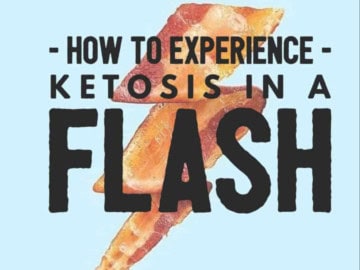Wondering how to use a low-carb, keto diet for weight loss or greater health successfully? Today's post is going to give you three easy tips to help you reach your keto goals.
So, you took the plunge and decided to go on a low-carb keto diet? Let me start off by saying that I believe you have chosen wisely.
Note that, most likely, your first-week weigh-in will be encouraging, but after several weeks, you may see that the scale is not moving as quickly.
You may be wondering if you have hit a true plateau or if your body is simply adjusting to a low-carb keto diet.
If you are sticking to the rules, your body is probably just getting used to this new way of eating. However, a little investigation may be necessary to ensure you are not missing the mark.
Here Are My 3 Proven Tips For Low Carb Keto Success
These proven tips will help you reach your low-carb goals. I recommend you review these tips any time you are having trouble getting ketosis or are not seeing the results you were hoping for.
The following are the things you need to check to ensure you are genuinely following the keto diet properly.
1. Check Your Carbohydrate Allowance
To get into ketosis, our bodies switch from being sugar “glucose” burners to using fat “ketones” for fuel. We need to stay within 25–30 grams of carbohydrates per day.
Unfortunately, after a coaching session, we find that people may consume more than 100–175 grams of carbohydrates daily.
This is why they may not be losing weight consistently. Carbs like to hide in our food, and we can easily see these levels rise without even realizing it.
There are varying ideas of what constitutes a low-carb keto plan. I agree that 100–175 grams of carbs a day is still better than the average American diet, which contains upwards of 300 carbohydrates.
However, this is not an actual low-carb keto diet; that range is not relatively low enough.
Everyone’s body is different when it comes to getting into ketosis. However, most people will need to stay under 30 carbs a day for maximum results.
You will have to do some experimenting to see where your body likes to be for optimal health.
Focus on the foods you can eat and not on what you can't in order to make your lifestyle easier.
2. Do You Have a Fat Phobia?
The average person gets most of their calories from carbs, specifically grains and sugar. When eating low carb, you remove carbs as your primary energy source.
This is why we must replace it with good fats to avoid stalls and muscle waste.
The reality is that it takes a complete mental shift from being fearful of dietary fats to embracing them as fuel. Old mindsets can be challenging to break.
This is why some low-carbers make the mistake of trying to eat both low-fat and low-carb.
Unfortunately, this won't work. You either keep trying to lose weight on a low-fat diet or move completely to the low-carb keto lane. You can’t dabble in both diets and see long-term results.
We Need Healthy Dietary Fats
Do you know that science has now proven that there is no logical reason to fear fat? The key is to have healthy saturated fats from natural sources and fats that are rich in monounsaturated fatty acids.
Would you like to save this?
That means your omega-3 oils, real butter, coconut, and olive oils, as well as animal fat.
You should steer clear of man-made oils like canola and vegetable oils and the dreaded trans fats found in processed foods.
According to Dr. Jeff S. Volek a registered dietitian, and Dr. Stephen D. Phinney, a medical doctor, our fat intake should be around 70% of our total calories if we want a proper ketogenic diet.
When we consume more fat, we naturally eat less because we are more satiated. Consuming healthy fats is a key to eliminating cravings on a low-carb keto diet.
3. Monitor Your Protein
Having enough protein is essential in our diet, especially when trying to lose weight, as it’s a vital building block for gaining muscle.
Yet a common mistake is to eat way too much of it. Eating low-carb is not an excuse to binge on your favorite proteins.
When you consume more than your body needs, some of the amino acids in the protein turn into glucose, which turns into stored fat. This is precisely what you are trying to avoid.
Don't Overconsume Consume Protein
Eating too much protein will not allow your body to go into complete ketosis. If you do, you risk plateauing or gaining weight when your protein levels are too high.
Keep your protein levels within healthy limits by determining how much you actually need based on your activity level.
This means that people who are more physically active have higher protein requirements than those who are not as active and have a more sedentary lifestyle.
For an accurate protein count that fits you, consider using a keto app.
Grab Our Books & APP
In case you don’t know, we have authored two books for you, Essential Keto Bread and Essential Keto Desserts, both inspired by your requests over the years. I pray these keto cookbooks will help make keto a delicious breeze for you.
Gain access to simple and delicious recipes for breakfast, lunch, dinner, snacks, and even desserts with our FITTOSERVEGROUP APP.
Join Our Jesus And Keto Movement
Looking for an online support system to help you stay on keto? As a family, we came to the keto diet, looking at it from a Christian perspective. As believers, we live our lives supported by God's grace.
Knowing firsthand the benefits of this decision, we have created a closed Christian group that is using the keto diet to transform their lives.
We invite you to join our Private Facebook Group and see if it's not the key you have been missing.
Be sure to request our FREE Jesus and Keto E-Book (First 7 Days). We hope it blesses you.







SimpleLivingOver50 says
Introduce Intermittent Fasting
fittoservegroup says
Yes! I need to do a post on this. Thanks for your input???
SimpleLivingOver50 says
I am just finishing up The Obesity Code by Dr. Jason Fung and find his research on IF to absolutely amazing.
fittoservegroup says
Thanks for the tip!
Delicia Guyer says
I came in from work today on a mission to make this yummy looking pound cake! Well . . . it did not look like yours. It was crumbly looking and dry. I am guessing because I used the almond flour meal instead of the finer ground regular almond flour? I am going try again. I do not give up easy and LOVE pound cake. ; )
Hilda Solares says
Hi Delicia, the texture will be off if you use almond meal and could make the cake dry. It’s worth giving it another try. There’s a reason why it’s a favorite in the keto community. ??